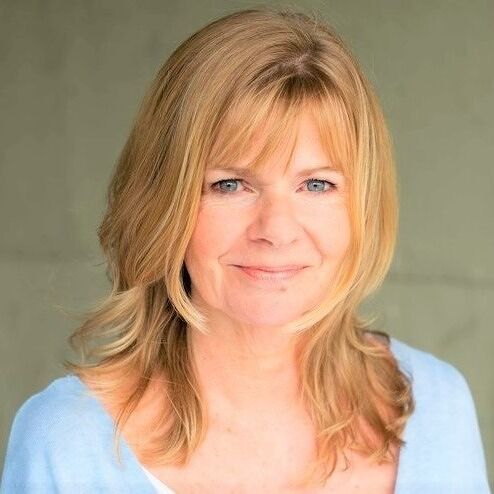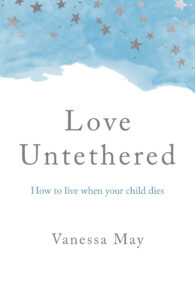
Love Untethered: How to live when your child dies
By Vanessa May/ www.ayni-books.com
Perhaps the principal theme of ‘Love Untethered’ is how the death of a child rips a family apart and is irrevocably life-changing. Nothing can ever be the same again and the pain of this type of loss is beyond anything most people can possibly imagine. The loss of a child is every parent’s worst nightmare and feels as if it will be impossible to survive. ‘Love Untethered’ is primarily one woman’s personal story of her son’s sudden and unexpected death. But it is also more than this…
Whilst many books about grief focus primarily on the emotional impact of loss, ‘Love Untethered’ also looks at the effect that loss can have on the mind, body and spirit. Unlike the detrimental effects upon the mind and body, grief can, by contrast, sometimes actually have a positive and metamorphic effect upon the spirit. Interestingly, many people who have experienced a significant loss, find it facilitates a new belief in life after death and an ongoing connection with their loved one. This is discussed in the book from both a personal perspective and by presenting some research on this subject. The author shares incredible signs she received from her son; how she began to feel him around her and how this, and visits to mediums, helped her live with her loss and offered a much-needed a glimmer of hope. She describes how her new-found spiritual connection to her son was key to her survival.
‘At first, when your child dies, it feels as if all your love for them no longer has anywhere to go, that it is somehow untethered. However, the truth is, you continue to love them regardless of the fact that they are no longer physically present and, in fact, your love for them expands beyond all measure.’
These words are taken from the introduction to ‘Love Untethered: How to live when your child dies.’ Plunged into intense grief and extremely traumatised, the author does not shy away from the terrible realities of traumatic grief. Some of those around her didn’t share her spiritual viewpoint of life after death, assuming she was clinging onto this out of denial and desperation. She explains that when your child has crossed over, it can feel as if your part of your soul has gone with them but, by learning about the afterlife, it becomes easier to find them where they now reside. Inevitably however, when we lose someone, we focus on who they were to us in this life, how we loved them in their human form and that’s obviously very natural, as well as sometimes excruciatingly painful.
Although conceding that a badly broken heart can be cracked open and therefore awakened (the wound is where the light enters) and that this can potentially provide an incredible opportunity for soul growth, the author avoids any ‘toxic positivity’ and makes it very clear that, given the choice, she would prefer to ‘go back to sleep’ and have her child back here on earth. But she acknowledges that without her ‘spiritual awakening’, surviving such a heart-breaking loss would be even harder and that the glimpses of other possibilities beyond this ‘earth school’, sustain her when she inevitably gets pulled down into the earthbound realms of grief and suffering.
‘Sometimes, the skies clear and I have a powerful sense of ‘knowing’ that’s hard to describe. I feel my son’s energy and it seems increasingly purer and finer. Our communication feels progressively different from how it did when he was physically here. It appears that in our separation our connection somehow grows ever stronger, an invisible ethereal cord joining us together. When I align with this feeling of indestructible unconditional love, my heart and my soul seem to know something that my head doesn’t – an indisputable knowing – and this brings me such peace, and even joy.’
Another, more down to earth theme of the book is the provision of practical advice on how to support yourself during grief. With a few exceptions, most books on grief are either memoirs or offer professional advice, whereas this book offers both. ‘Love Untethered’ is unique in that it’s a candid account of traumatic loss combined with advice, not only from the perspective of a bereaved mother, but a holistic grief coach, nutritional therapist and wellbeing coach.
As a registered nutritional therapist, the author provides a much-needed explanation of the physical impact of grief and trauma. This can be significant and far-reaching but is often overlooked. She acknowledges that looking after your health and wellbeing may not feel like much of a priority after you’ve lost someone important; that you may have little appetite or, alternatively, a need to comfort eat. Whilst she advocates a nutritious and balanced diet, the author is also a bereaved mother so understands first hand that eating well when you’re grieving is sometimes easier said than done and therefore provides practical and realistic advice.
She describes how grief can increase inflammation, affect your immune system, compromise your digestion, cause brain fog and deplete energy levels and how research shows that the stress of grief can potentially lead to some serious health issues, such as cancer, heart disease and broken heart syndrome – so the better your diet is, the stronger you will be physically. That, in turn, will then have an effect on your emotional wellbeing too.
Another of the themes in ‘Love Untethered’ is how we live in a grief-averse society. It’s only in recent years that mental health issues have started to receive the awareness and attention they deserve and the author hopes to see a similar improvement in awareness directed towards grief. We live in a society where grief is largely ignored – unless it’s collective grief for a public figure such as the Queen – and so it can feel stigmatized for those who are grieving a loved one. In view of both her own experience and the experience of her grief coaching clients, it seems many people lack sensitivity towards, or understanding of, the complexity and long-term effects of a significant loss. And in the case of child loss, people frequently display a fear of interacting with someone living their worst nightmare, so they often choose to avoid the bereaved parent altogether. This is a travesty because the more compassionate and grief-aware we are; the more resilient grieving people can then become. This is undoubtedly a very salient theme and it is to be hoped that through the telling of her own story, together with her professional experience, the author will help to raise awareness around this very important topic.
Ultimately, ‘Love Untethered’ does not offer unhelpful platitudes, toxic positivity, spiritual bypassing or unrealistic expectations. Instead, the book strikes a balance between acknowledging the stark reality of grief and trauma; the shocking and complex nature of ‘out of order’ and sudden deaths, with the hope of finding purpose and meaning again, even after the very worst of all losses. The author’s personal experience of these themes undoubtedly makes this altogether more relatable.
Love Untethered: How to live when your child dies By Vanessa May is available from AYNI books and from wherever books are sold.
BOOK LINK: https://www.johnhuntpublishing.com/ayni-books/our-books/love-untethered-how-live-your-child-dies